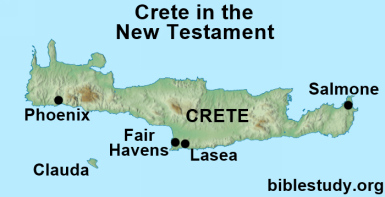Bible Meaning: Fleshy
Strong's Concordance #G2914
Crete, located south of the Aegean Sea, is the fifth largest Mediterranean island in terms of land. The Roman province of Crete - Cyrenaica, not mentioned in the New Testament, was created in 67 B.C. It included the island as well as the region of Cyrenaica that was located south of the island on the African coast.
The New Testament mentions only four locations, by name, on Crete. They are the harbor of Fair Havens (Acts 27:8) and the towns of Salmone (verse 7), Lasea (verse 8) and Phoenix (verse 12).
Salmone, a port city on the far eastern side of Crete, was known for its temple to the pagan Goddess Athena. Ships harbored at Fair Havens were protected only from Mediterranean winds coming from the north or northwest. Sailing vessels at the western port city of Phoenix (Phenice in the KJV), however, were secured against all winds and could dock during winter in order to avoid the tumultuous weather on the Mediterranean Sea (Acts 27:8 - 12).
The gospel and the island
Those who resided on the island, while visiting Jerusalem to keep the Day of Pentecost in 30 A.D., were some of the first people to hear Jesus' disciples preach the gospel (Acts 2:1 - 11).
During Apostle Paul's fourth missionary journey, while a prisoner bound for Rome, the ship he is on harbors for a time at Fair Havens (Acts 27:8 - 9). The next time he visits Crete is right after his first imprisonment in Rome that ended in early 63 A.D. After leaving the island, he writes a letter to Titus (Titus 1:4) offering instructions on how to shepherd new believers and commanded him to appoint church leadership in every city (verse 5).

Important Verses
Acts 2:7 - 8, 11
And they were all amazed and marvelled, saying one to another, Behold, are not all these which speak Galilaeans? And how hear we every man in our own tongue, wherein we were born? . . .
Cretes and Arabians, we do hear them speak in our tongues the wonderful works of God.
Acts 27:7, 12 - 15
And when we had sailed slowly many days, and scarce were come over against Cnidus, the wind not suffering us, we sailed under Crete, over against Salmone . . .
And because the haven (the Fair Havens harbor) was not commodious to winter in, the more part advised to depart thence also, if by any means they might attain to Phenice (Phoenix), and there to winter . . .
And when the south wind blew softly, supposing that they had obtained their purpose, loosing thence, they sailed close by Crete. But not long after there arose against it a tempestuous wind, called Euroclydon. And when the ship was caught, and could not bear up into the wind, we let her drive . . .
But after long abstinence Paul stood forth in the midst of them, and said, Sirs, ye should have hearkened unto me, and not have loosed from Crete, and to have gained this harm and loss.
Titus 1:1, 4 - 5
Paul, a servant of God, and an apostle of Jesus Christ, according to the faith of God's elect, and the acknowledging of the truth which is after Godliness . . .
To Titus, mine own son after the common faith: Grace, mercy, and peace, from God the Father and the Lord Jesus Christ our Savior.
For this cause left I thee in Crete, that thou shouldest set in order the things that are wanting, and ordain elders in every city, as I had appointed thee.